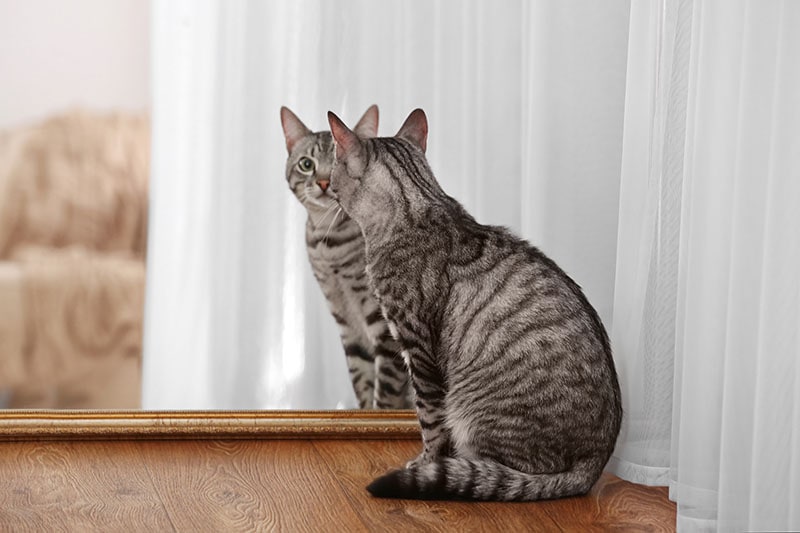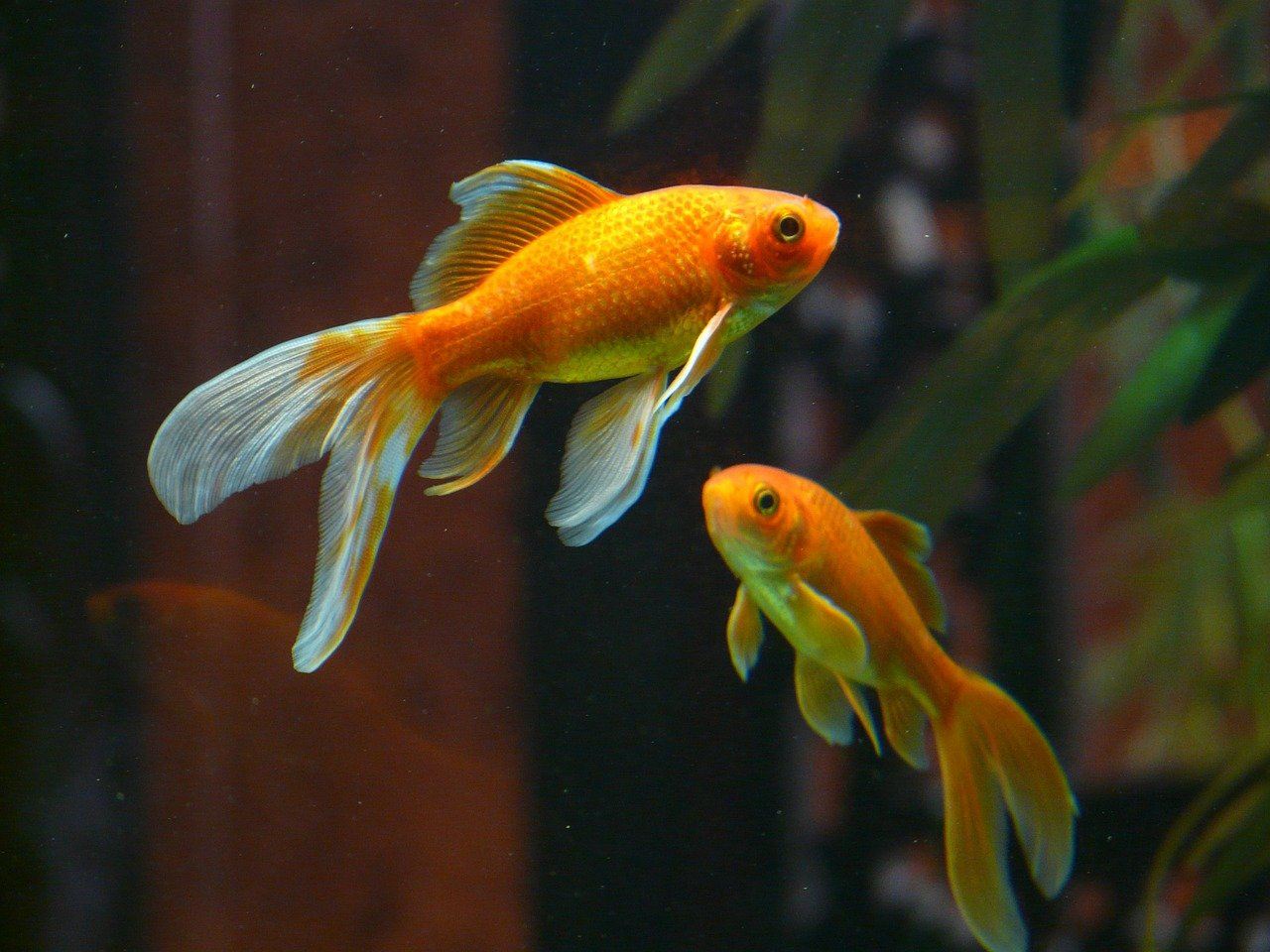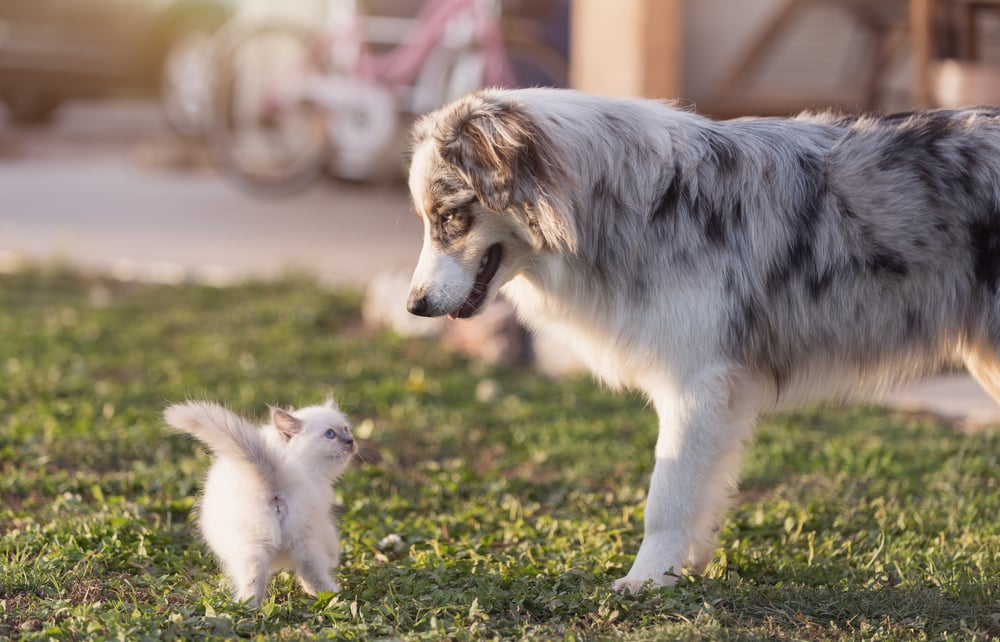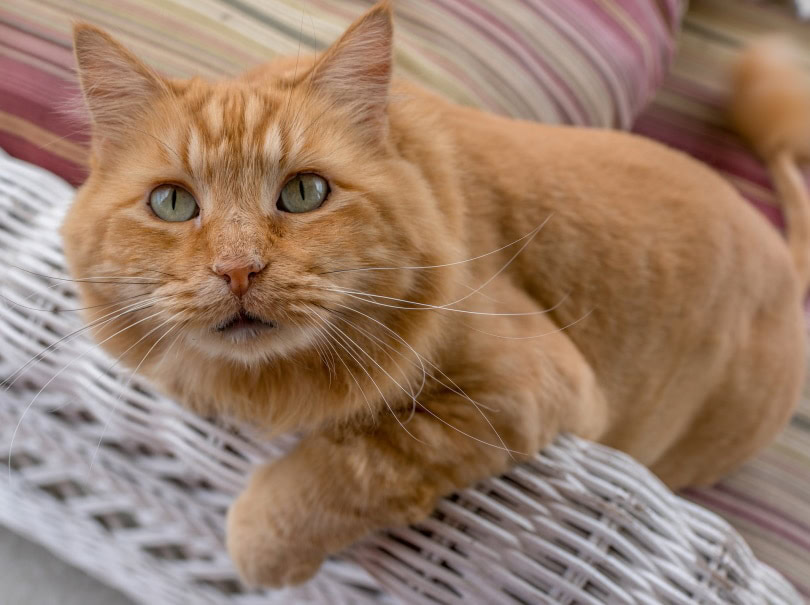VET APPROVED

The information is current and up-to-date in accordance with the latest veterinarian research.
Learn more »Click to Skip Ahead
It’s always fun watching cats fooling around in front of a mirror. They will puff themselves up, dash behind the mirror to look for the intruder, or even try to attack the reflection by clawing or slapping at the reflection.
It is clear cats can see their reflection. However, whether they recognize themselves is a question that has puzzled scientists and animal behaviorists for years. According to research, cats perceive their reflection as another feline, so they probably don’t recognize themselves.
Below, we look at what science has to say on the matter. We also explain why cats react differently in front of the mirror. Let’s dive in.

What Science Tells Us
Most studies conclude that cats can’t recognize themselves in the mirror. One of the most famous studies is the Mirror Self-Reflection Test, famously known as the “red dot test.” It was conducted in the 1970s by psychologist Gordon Gallup.1 Gallup wanted to know the level of self-awareness in different animal species by testing whether they could tell the reflection in the mirror was of them.
First, he would mark the animals’ foreheads with a red dot while they slept and then place a mirror in front of them after they woke up. Animals who paid attention to the red dot by touching or scratching it were deemed to have passed the mirror test. That was proof that they knew the reflection in the mirror was of themselves.
Animals who passed the mirror test include:2
- Orca whales
- Bottlenose dolphins
- Great apes
- Asian elephants
- Ants
As you may have guessed, cats and dogs didn’t pass the test.

Why Cats Don’t Recognize Themselves in a Mirror
Cats don’t rely so much on vision when identifying humans and other animals. Instead, they rely more on their sense of smell. For instance, cats don’t know who their owners are by facial recognition but by identifying their scent.
Cats’ color vision is not as rich as that of humans. A kitty may not perceive the reflection in the mirror as a cat because it will be confused by the lack of smell. It is likely to lose interest after careful investigation.
Why the Mirror Test May Not Be Accurate
Critics of the Mirror Test claim it is biased since some animals, like cats and dogs, rely on their olfactory or hearing senses and don’t know how they look.
Indeed, studies conducted with dogs have shown that canines can distinguish their urine from other dogs’ urine. Although there are no similar studies with cats, it’s not far-fetched to assume they would pass the sniff test, too.
Fear and not lack of self-awareness may also be the reason why some cats fail the test. Indeed, several chimpanzees and monkeys have also failed for the same reason before.
Although intelligent, fear caused them to react with hostility, and thus, they had no chance to familiarize themselves with the mirror.
Do Cats Have Self-Awareness?
Cats may not have passed the mirror test, but that does not mean they are not self-aware. A cat can understand their body’s limitations, who they are bonded to, and how to communicate with others.
For instance, a cat will jump onto the kitchen counter from the ground because they know they can jump that high. It may also avoid the aggressive neighborhood cat because they know they can’t win that fight.
Additionally, a cat will know how to get your attention when feeling hungry or thirsty.
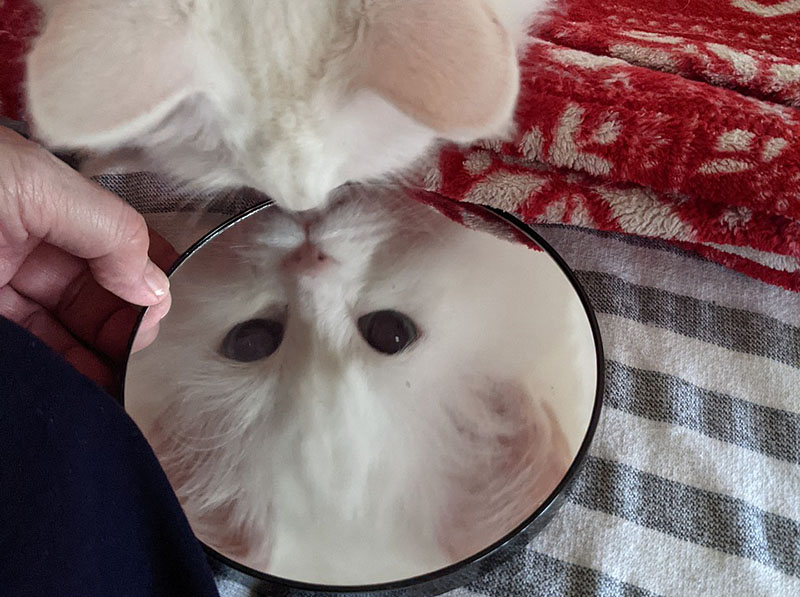

How Cats React to Seeing Their Reflection on the Mirror
Cats may not understand they are looking at a reflection of themselves in a mirror, but they do see a cat. The reaction may differ depending on the cat’s personality and past interactions with other felines.
Cats react in one of three ways: aggression, curiosity, and aloofness.
1. Aggression
Aggression is usually the most common reaction for cats seeing their reflection in the mirror for the first time. Since felines are territorial, they interpret the situation as an encroachment of their personal space and react aggressively by hissing, growling, or swatting at the mirror.
Cats judge intent through eye contact. And, of course, the cat in the reflection will also appear angry and aggressive. That can fuel the cat’s fear of aggression. It might even avoid mirrors altogether because of the adverse experience.
2. Curiosity
A cat with a friendly disposition will want to investigate upon seeing the reflection. It could get closer and attempt to touch or sniff the new companion. After failing to achieve contact due to the barrier, the cat might attempt to go around the mirror to meet the new friend.
3. Aloofness
Some cats will glance at the mirror and walk away without responding. There are two possible explanations for this lackadaisical attitude. First, the cat could have interacted with a mirror before and realized no cat was on the other side. Also, it could be that the cat may not be bothered or interested in the stranger in the household.
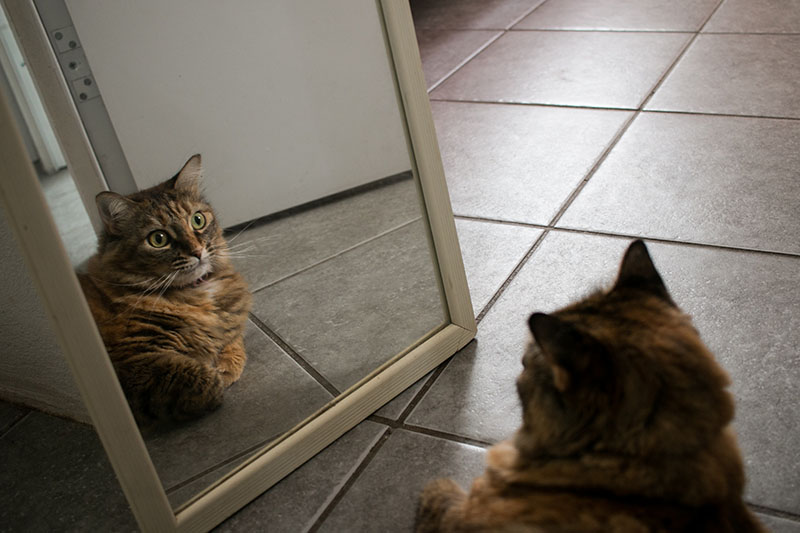

How to Train Your Cat to Accept Mirrors
Does your cat behave aggressively when in front of a mirror? It’s likely the reflection is triggering fear in your furry friend. This situation may be encountered in kittens who have never been exposed to mirrors and reflections.
It’s possible that your cat is scared of cats in the neighborhood, so keep them out of sight since they could be responsible for increasing the cat’s sensitivity to reflections. Keep your cat indoors and ensure the drapes are always drawn.
Once your cat seems more relaxed, you can expose them to mirrors again and use rewards and treats as you do so. That way, the cat will associate being in front of the mirror and seeing their reflection with positive feelings.


Summary
So, will a cat recognize themself in a mirror? Probably not. According to research, cats perceive their reflection as another feline. While some cats don’t seem bothered by the intruder, others will try to investigate out of curiosity. They will try to touch and smell the reflection and might even go around the mirror to meet the stranger.
Still, others will react aggressively out of fear. They might hiss, growl, or claw at the mirror. However, most cats soon discover the reflection poses no threat and grow out of the behavior.
- https://www.sciencedirect.com/topics/neuroscience/mirror-test
- https://www.animalcognition.org/2015/04/15/list-of-animals-that-have-passed-the-mirror-test/
- https://www.petmd.com/cat/behavior/why-cats-fight
- https://www.newsweek.com/self-aware-internet-shock-cat-recognize-reflection-1694220
- https://vcahospitals.com/know-your-pet/do-cats-see-color
Featured Image Credit: Africa Studio, Shutterstock
